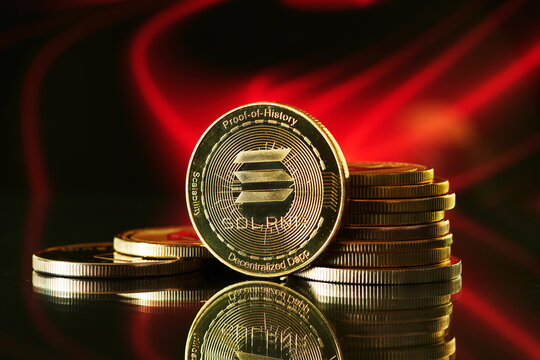Reason to trust

How Our News is Made
Strict editorial policy that focuses on accuracy, relevance, and impartiality
Ad discliamer
Morbi pretium leo et nisl aliquam mollis. Quisque arcu lorem, ultricies quis pellentesque nec, ullamcorper eu odio.
Another week, another of Crypto Tidbits. Bitcoin (BTC) bulls continued to show their faces after a brief lull.
Per data from Coin360, the leading cryptocurrency is up 6% over the past seven days. Despite the fact that altcoins are supposed to follow Bitcoin, assets like Ethereum, XRP, and so on actually underperformed BTC by a large margin, resulting in two-year highs for the Bitcoin dominance statistic.
Related Reading: Gann Theory Suggests Bitcoin Price at “Do or Die” Moment, Important Pivot Ahead
Price action aside, this week saw a number of interesting developments for the cryptocurrency space: the latest round of tariffs from Donald Trump have sparked another round of debates over Bitcoin’s potential as a safe haven; nations in the G7 have renewed efforts to crack down on crypto, and a number of industry startups made a handful of product announcements.

Related Reading: Crypto Tidbits: LedgerX Bitcoin Futures, Federal Reserve Rate Cut Bullish, Square Booms
- Leading Nations Looking to Crack Down on Crypto Money Laundering: Reported by Nikkei Asian Review, a consortium of some 15 countries, including the nations of the G7 (U.S., Germany, Japan, etc.), will be creating a platform that will ensure that crypto assets, like Bitcoin, will be hard to use in money laundering operations. The system, which is to be created and designed by the Financial Action Task Force, will collect and share the personal information of those that are involved in the crypto industry. Nikkei’s article reads: “The goal is to prevent funds from being laundered, going to terrorist organizations or otherwise being put to illicit use.” This comes as politicians like Donald Trump have vehemently come out against cryptocurrencies, especially Bitcoin and Libra.
- Binance U.S. Unveils Potential List of Supported Crypto Assets: Binance’s American subsidiary, Binance US, is nearing its launch. However, ever since it was announced back in mid-June, crypto investors have been wondering which altcoins the new platform would support, as the U.S. Securities and Exchange Commission (SEC) has yet to give clear guidelines for crypto exchanges. But Binance recently shocked the crypto trading community, unveiling a nice swath of digital assets it may support. The list includes the normal suspects, including Bitcoin and Ethereum, but also an array of smaller altcoins that may not ring a bell. The 30 cryptocurrencies that the Binance subsidiary is currently considering are as follows (in alphabetical order): ADA, ATOM, BAT, BCHABC, BNB, BTC, DASH, EOS, ETC, ETH, HOT, IOTA, LINK, LOOM, LTC, MANA, NANO, NEO, PAX, REP, RVN, TUSD, USDC, USDT, VET, WAVES, XLM, XRP, ZIL, and ZRX.
- Crypto-Friendly Social Media Firm Kik Pushes Back Against the SEC: For months now, crypto-friendly social media firm Kik, which famously hosted a $100 million ICO for the KIN project, has been tussling with the U.S. SEC. The regulatory agency sued the Canadian firm, claiming that it was in violation of securities laws. Kik is now fighting back. Earlier this week, the firm released an over 100-page document rebutting the SEC’s concerns. While the piece is quite long, there are a few key takeaways put forth by Kik’s team of lawyers and technologists: Kik did not sell digital securities, and thus did not violate any pertinent federal laws; the crypto isn’t the firm’s attempt to save itself from going under; KIN isn’t the only company foraying into social media digital assets, but is the first; the SEC is ignoring certain statements that would help Kik’s case; the SEC is operating on a “flawed factual and legal premise”. Some, funnily enough, have said that this “flawed premise” extends to its rulings on Bitcoin exchange-traded funds (ETFs).
- Ripple CEO Expects to Bag More Deals: Ripple chief executive Brad Garlinghouse told Yahoo Finance that he wants his firm to leverage its strong position in the market and large balance sheet to make more investments and acquisitions. No specific firms were mentioned, but Garlinghouse said that Ripple is looking into deals that will allow it to better satisfy its customers. This, of course, comes shortly after the firm bagged a deal with Moneygram, one of the world’s largest money-transfer firms, to utilize xRapid.
- Blockstream Launches Bitcoin Mining Service: Blockstream, the Canadian Bitcoin development and services giant, has just expanded its operations once again. This time, it is launching a mining service, which actually commenced operations in secret way back in 2017. This new division is a “mining equipment colocation” service, which promotes “institutional and enterprise customers” to deploy “virtually any type of Bitcoin mining equipment” in any of Blockstream’s centers. Currently, the colocation service is used by Fidelity Investments, the prominent Wall Street firm that has been mining Bitcoin in-office for years; pro-crypto LinkedIn founder Reid Hoffman, and Blockstream itself, which claims to have machines that power “less than 1%” of the Bitcoin network. The firm is also launching a mining pool that will promote decentralization.
- Bitcoin Hash Rate Continues Higher: Despite Bitcoin’s tumultuous price action, miners continue on adding capital to the space. This week, Bitcoin’s hash rate surmounted 80 EH/s for the first time ever.
- EtherDelta Involved in Scam: China: According to Dovey Wan, a prominent Chinese crypto investor and industry insider, EtherDelta is purportedly involved in an exit scam. The popular Ethereum decentralized exchange was purportedly quietly sold off to Chinese investors by the SEC-charged Zack Coburn. The unnamed investors then later used their newly-acquired platform to sell a crypto asset with EtherDelta branding in an apparent exit scam. The details of this case are still unclear.
- New Crypto Platform FTX Bags $8 Million: FTX, an up-and-coming crypto trading platform backed by many of the individuals at industry fund Alameda Research, has secured $8 million in investment from a number of industry venture firms.
- Bitwise Claims Libra Accelerated Crypto by Three Years: Bitwise’s Matt Hougan claimed that Libra helped to propel the industry to “center stage”, which is especially important for an industry as fringe and abstract as digital assets and non-fiat monies. Elaborating, Hougan added that Libra is also important because it and “other catalysts” have “changed the nature” of the conversations that investors and others are having about this industry. This paradigm shift in how the public addresses Bitcoin and its ilk, he adds, has been seen across the globe.
Featured Image from Shutterstock

















